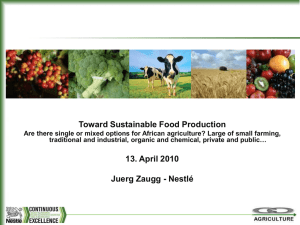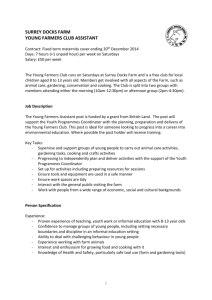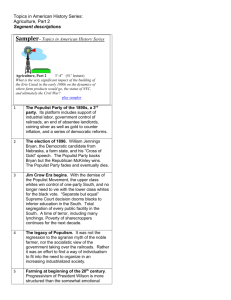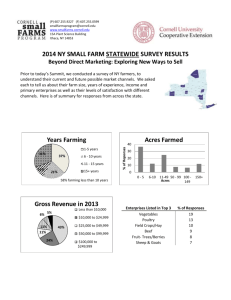Dairy Industry Progression Group 2025 Submission
advertisement
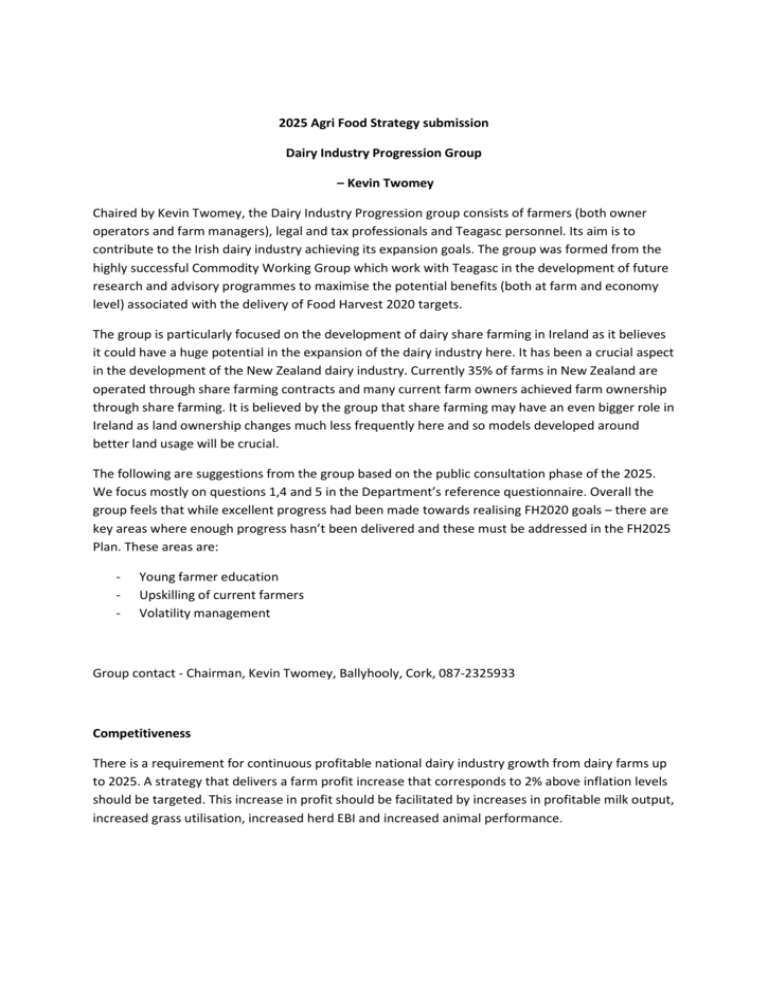
2025 Agri Food Strategy submission Dairy Industry Progression Group – Kevin Twomey Chaired by Kevin Twomey, the Dairy Industry Progression group consists of farmers (both owner operators and farm managers), legal and tax professionals and Teagasc personnel. Its aim is to contribute to the Irish dairy industry achieving its expansion goals. The group was formed from the highly successful Commodity Working Group which work with Teagasc in the development of future research and advisory programmes to maximise the potential benefits (both at farm and economy level) associated with the delivery of Food Harvest 2020 targets. The group is particularly focused on the development of dairy share farming in Ireland as it believes it could have a huge potential in the expansion of the dairy industry here. It has been a crucial aspect in the development of the New Zealand dairy industry. Currently 35% of farms in New Zealand are operated through share farming contracts and many current farm owners achieved farm ownership through share farming. It is believed by the group that share farming may have an even bigger role in Ireland as land ownership changes much less frequently here and so models developed around better land usage will be crucial. The following are suggestions from the group based on the public consultation phase of the 2025. We focus mostly on questions 1,4 and 5 in the Department’s reference questionnaire. Overall the group feels that while excellent progress had been made towards realising FH2020 goals – there are key areas where enough progress hasn’t been delivered and these must be addressed in the FH2025 Plan. These areas are: - Young farmer education Upskilling of current farmers Volatility management Group contact - Chairman, Kevin Twomey, Ballyhooly, Cork, 087-2325933 Competitiveness There is a requirement for continuous profitable national dairy industry growth from dairy farms up to 2025. A strategy that delivers a farm profit increase that corresponds to 2% above inflation levels should be targeted. This increase in profit should be facilitated by increases in profitable milk output, increased grass utilisation, increased herd EBI and increased animal performance. Farmer Education The key drivers of profitable expansion within the dairy industry will be young trained and highly skilled farmers. There is a requirement to identify the necessary skillset to match each possible career step for all on farm human resource roles. Ireland needs a capability matrix (http://www.dairynz.co.nz/media/932596/dairy-farm-role-descriptions-A3_DNZ20013_SINGLEPAGEWEB.pdf) which identifies the skillsets and the human resource development to reach them. There are currently more young people than ever studying agriculture and these must be nurtured into top class farmers. Many people intending to farm, finish structured education at Level 6 at which point they would still benefit greatly from further education and work experience on other farms. There is therefore a requirement to further up skill young farmers as well as up skilling the host/mentor farmers who they interact with. We need much more focus across the industry on key business management principles such as goal setting, planning and financial analysis. The present target of young trained farmers completing the professional farm managers course is not being met, there is an urgent requirement to refocus efforts to hit the Food Harvest 2020 target of 100 trainees qualifying per year. As part of the new 2025 targets we should increase this to 200 trainees per year. There is a requirement to develop education modules that have specific standards to ensure uniform up skilling across the entire industry. These courses will help build a culture of continuous improvement and potential from learning from one another within and across the industry. The group believes a similar structure to Primary ITO in New Zealand is essential to achieve the level of up-skilling the Irish dairy industry needs to truly capture the post quota opportunity. http://www.primaryito.ac.nz/about-us http://www.primaryito.ac.nz/qualifications/dairy-industry-training The dairy industry needs to have an organisation for education standards to oversee the provision and development of the courses offered. This would be similar to the PrimaryITO in New Zealand which operate courses successfully for the New Zealand industry. This newly formed group would ensure that the standards of education were sufficient and would act as auditors for these types of courses. There could be any range of service providers providing each of the courses, all overseen by the PrimaryITO group. There is a requirement to develop a number of Capability Development courses (CDC) that are run on an on-going basis that are geared to increasing the skillset of the industry. Potential CDC courses should be open to anyone that enters agricultural industry. As the national dairy program evolves, there is a requirement for continual learning. We envisage this modular approach to up skilling will facilitate the continuous learning on farm. This newly developed education structure could be incorporated into the RDP scheme and any other subsequent schemes. Potential CDC courses could include; Milking routine Grassland management Financial Management Strategic Planning People Management Environmental sustainability management Health and Safety Wealth creation Cell Check Stock management Communication Farm maintenance Herd Health Breeding Management The completion of the CDC courses by current farmers could be overseen as part of the quality assurance scheme. The level of CDC course completion could be linked to the capability matrix. Young Farmers Create mentor programs for farmers Upon entering any farming education course each student should be matched up with a mentor and given guidelines to go through a mentoring programme which would challenge the student to become clearer on their own goals and the future skills and experiences they will need to succeed. Mentors could be host farmers of placement or other industry professionals. Create a culture of family farm transition between the different entities through the development of structures such as partnerships, share farming, etc. Continue to incentivise the collaborative structures via taxation etc. Develop strategies to ensure the control and responsibility within the business passes to the younger entity at an early age thus creating trust between the different entities of the business. Development of a demo programme to show the potential of collaborative structures. Correct the anomalies brought about by the recent changes in the lease structure which incentivise away from collaborative structures by giving collaborative structures similar tax incentives available on leases. Education Professional Farm Manager’s There is a requirement to develop the present professional farm manager’s diploma to a degree level. It is necessary to provide the option to transition from the current level 7 to a level 8 qualification. Entry should be widened to include students with level 5 qualifications in any discipline as well as directly through the CAO entry system. Milk payment systems Milk payment systems are an extremely powerful communication tool between the processor and the farmer. For example multiple component pricing schemes have been introduced in Ireland in a significant way since 2007. Since then milk solids percentages are increasing at a 50% faster rate than they were before the payment systems were introduced. Milk pricing schemes should be advanced to incentivise an increase in milk quality as well as well as an advancement of the overall sustainability of the milk production systems operated. Milk payment systems that have a negative impact on the financial sustainability of pasture based systems should be strongly discouraged. Examples include seasonality based payment schemes that encourage either December or January milk production. Grants including TAMS grants These grants provide significant funding for investment on farm. As part of qualifying for the grants there should be requirement to complete a five year plan with budgeted stock numbers, future investment plans and cash flow budgets. This is a similar process to that which was operated when milk quota was allocated to new entrant milk suppliers. This requirement encourages the development of essential skills for farmers. Financing options There is a requirement to develop innovative ways to provide finance to young trained farm business managers who have significant potential to grow their business and their overall net worth even though they currently do not have significant equity. Up to now this has not been a significant barrier to expansion but in the future it may well restrict career progress of some individuals. All potential options should be investigated. The options encouraged should include higher unsecured lending, introduction of chattel mortgages, development of stock warehousing facilities that would allow the bank sell stock if required. Taxation Thereare a number of very positive changes to the tax structure in Ireland for agriculture in 2014. These changes will have a significant positive effect on farming, however a key concern centres on issues that are related to milk price volatility (both on a positive and negative). It is becoming more apparent that for farmers to be able to deal with volatility that there is a requirement to introduce schemes that encourage farmers to manage the variation in milk receipts. The introduction of a scheme similar to the farm management deposit scheme as operated in Australia would take out the problem of volatility virtually overnight. While it is accepted that there may be issues around state aid, the group believe that this is an EU wide problem and suggest that there is significant potential from pushing this type of scheme right across the EU where the issue could be even more serious. Farm Management Deposit Scheme (FMDS) Surviving milk price volatility while expanding a dairy business will be arguably the biggest challenge for Irish dairy farmers. A taxation program that would help manage volatility is deemed by this group to be highly important. The FMDS allows farmers to make a pre-tax deposit of cash into a bonded bank account for a period of time. Tax is paid when the money exits from the account. The tax is therefore deferred and not lost. This allows farmers to put away cash in good years and creates a reserve of cash that could be used in times when milk price drops. This scheme incentivises farmers to manage volatility and allows farmers to build cash reserves which are taxable on exit. Example Farm Management Deposit scheme based on average profitability data for the Teagasc E Profit Monitor over the period 2007 to 2013. Profit Drawings* Reinvestment FMD Taxable FMD Transfer income Balance 2007 69,050 45,000 9,050 15,000 54,050 15,000 2008 57,580 45,900 4,180 7,500 50,080 22,500 2009 21,000 43,500 0 -22,500 43,500 0 2010 50,100 47,755 2,345 0 50,100 0 2011 64,600 48,710 5,890 10,000 54,600 10,000 2012 51,700 49,685 2,015 0 49,685 10,000 2013 83,745 50,677 18,070 15,000 68,745 25,000 Note: Tax paid is included in the analysis based on the drawings and the reinvestment figures. For this analysis it is assumed that the profitability and the cash surplus for the farm are the same. From this table it can be noted that the farm put money into the scheme in 2007 and 2008 and drew down the money in 2009 and paid the tax owed when the money was drawn down. *Drawings increase by 2% per year except in 2009 when drawings were reduced to cope with the poor profits caused by the drop in milk price. Subsidies Any additional incentives over the SFP should be targeted toward younger trained progressive farm business managers that are taking part in the CDC program. Beef There will be a significant increase in the amount of male and female beef calves originating from the dairy herd in the future. The potential for these calves to deliver profit to various stakeholders in the beef or other industries needs to be investigated and the potential for a market outlet for these calves should be sought. Labour and People Management The skillset needed to effectively manage staff is not possessed by many farmers. Farm owners will need to gain an understanding on how to manage labour on farm as well as learning how to manage their own time as part of a larger scale business. There is a requirement to develop a strong research, extension and training programme around human resource management on farm.
